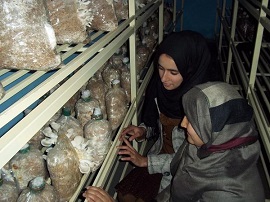FAO’s Mushroom Growth Project has opened a new window for livelihood development of women in the rural and peri-urban areas of Afghanistan

The idea of promoting mushroom cultivation has opened up a new window of opportunity for landless women farmers. Mushrooms have the advantage of being nutritious, easy to grow and require a lower level of start-up capital, and hence are a viable crop for women farmers to cultivate in their kitchen gardens or within their household compounds, contributing to the livelihood of their vulnerable and food insecure households.
FAO's project GCP/AFG/072/LUX brought in experts and educated 10 women trainers to act as qualified trainers in order to give training on spawn production and mushroom cultivation to other village women. This is the first time that women were able to produce spawns locally; before the spawns were imported from neighboring countries. By December the number multiplied to 220 women effectively farming mushrooms within their household compounds. They were also provided with the necessary tools and equipment as well as 48 selected sites for work. The program also supported the women with processing, packing, and marketing of the product.
"I find it a very good small business, it's clean, needs a fairly small start-up fund, has a good future because it is healthy and nutritious", said Maryam Afzali a farm owner in Dehdadi district. She is a widowed mother of 6 children with the eldest being 14, and she is responsible for putting food on the family's table. Her home-based farm now produces up to 40kg of mushrooms a month making about 12,000 Afghanis (nearly US$200). "It's very good because it does not need a lot of land, or a huge start up fund, it neither needs women to work in the field and so even women of the most conservative families can do this inside their homes", Maryam added. Despite, the model being supplied with only basic facilities; the project initiative had a positive effect on the livelihood prospects of women and offered more opportunities to them within their limited resources.
Rona, a high school graduated farmer woman, belonging to Karmalik in Dehdadi district of Balkh Province. After her school graduation, she attended the mushroom cultivation training consisting of both theoretical and practical sessions for a month at Cultivation Centres along with other 20 women. During the first week of training, she was provided with theoretical information about mushroom cultivation and growing and over the next three weeks she received practical training. The practical sessions consisted of several sample stages of 20-25 days, starting from substrate for mushroom cultivation to harvesting. After successful completion of training, as a beneficiary, she started making efforts to initiate mushroom cultivation in her house; and in addition, she will be working with other women groups as a trainer in mushroom cultivation.
Angiza is another beneficiary who produced 16kg mushroom, she supplied (6 kg) of her first crop of mushrooms to her family and remaining 10kg was supplied to the market. She started earning 300 Afghanis p/kg from mushroom products. For the time being, mushroom producer/training beneficiaries sell their products through the project's established centres to local groceries at a low price rather than the market where the price is higher due to higher demand. Since their products are supplied with no standard level of marketing or value-addition such as drying and packaging they are limited in terms of market reach. Now, the project intends to develop a business plan to address these constraints in order to make the process sustainable and more profitable for the women participants.
* Project: Sustainable Agriculture and Rural Development, GCP/AFG/072
* Published: March 2016
